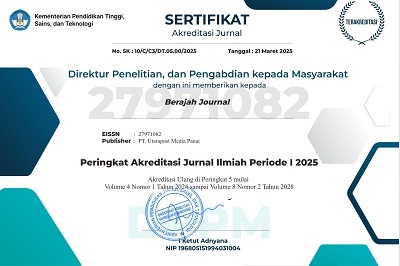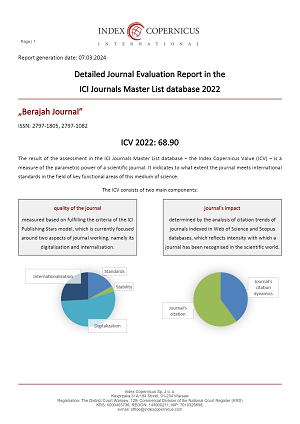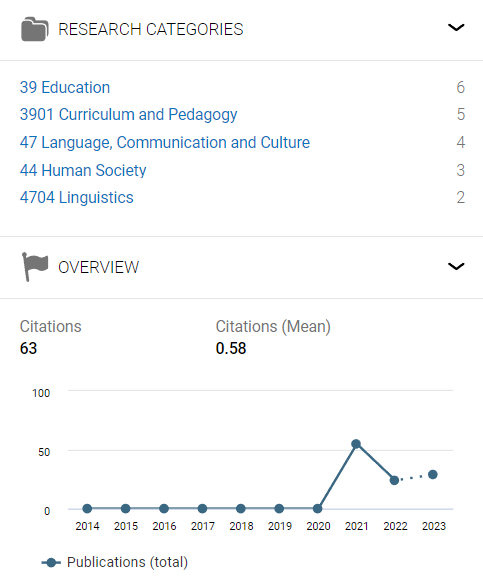EVALUASI IMPLEMENTASI SERTIFIKASI HALAL TERHADAP PELAKU USAHA MIKRO DAN KECIL
DOI:
https://doi.org/10.47353/bj.v4i3.357Keywords:
evaluation, certification, MSMEsAbstract
Indonesia is one of the countries with the largest Muslim population in the world. As mandated by the 1945 Constitution, the government has an obligation to protect all its citizens, including providing halal food. The government has issued Government Regulation no. 33 of 2021 concerning the Implementation of Halal Product Guarantee and Regulation of the Minister of Religion No. 20 of 2021 concerning Halal Certification for Micro and Small Business Actors. This research aims to evaluate the implementation of these two regulations for MSEs. The method chosen in this research is a literature study with the hope of expanding the scope of information regarding the implementation of halal certification for food and beverages produced by MSEs. The research results show taret the halal certification program for food and beverages produced by MSEs is not yet fully effective and has not had a direct impact on improving the economy of MSEs. Currently, what MSEs need is how to create a market and also brand their business so that it has uniqueness.
Downloads
References
Afroniyati, L. (2014). Analisis Ekonomi Politik Sertifikasi Halal Oleh Majelis Ulama Indonesia. Jurnal Kebijakan & Administrasi Publik JKAP. Indonesia: Peneliti The Wiratama Institute 18(1) 37-52
Ahmad, H.J & Alfarid, F. (2022). Sehati: Peluang Dan Tantangan Pemberian Sertifikasi Halal Gratis Bagi Pelaku UMK Di Indonesia. Jurnal Penelitian Hukum Ekonomi Islam. Gontor: Universitas Darussalam Gontor 7(2)182-192
Bruinessen, M.A. (1998). Rakyat Kecil, Islam dan Politik.Yogyakarta: Yayasan Bentang Budaya
Desy, S., Anggraini,Titik & Fahri. (2024). Meningkatkan Kesadaran Akan Pentingnya Sertifikasi Halal Bagi Pelaku UMKM Di Kecamatan Pontianak Barat. Jurnal Nusantara Berbakti. Pontianak: Fakultas Ekonomi dan Bisnis Universitas Tanjungpura 291)207-214
Dougall, J.M. (1996). Ketua MUI KH. Hasan Basri: “Kalau Umat Islam Tenteram, Negara Ini Tenteram”. http://www.hamline. edu/apakabar/basisdata/1996/12/23/0038. html. Diunduh pada tanggal 2 mei 2024
Peraturan Menteri Agama No. 20 Tahun 2021 Tentang Sertifikasi Halal Bagi Pelaku Usaha Mikro dan Kecil
Peraturan Pemerintah No. 39 Tahun 2021 tentang Penyelenggaraan Bidang Jaminan Produk Halal diperdagangkan di wilayah Indonesia
Peraturan Pemerintah Nomor 69 Tahun 1999
PP No. 33 Tahun 2021 Tentang Penyelenggaraan Bidang Jaminan Produk Halal dan PMA No. 20 Tahun 2021 Tentang Sertifikasi Halal Bagi Pelaku Usaha Mikro dan Kecil.
Staniland, M. (2003. Apakah Ekonomi Politik itu? Sebuah Studi Sosial dan Keterbelakangan. Jakarta: PT. Raja Grafindo Persada
Sugiyono. (2013). Penelitian Pendidikan. Pendekatan Kuantitatif, Kualitatif, dan Metode R&D. Bandung: Alfabeta
SK Menteri Agama Nomor 519 Tahun 2001 tentang Lembaga Pelaksana Pemeriksaan Pangan Halal
Undang - Undang no. 33 Tahun 2014 Tentang Jaminan Produk Halal
Downloads
Published
How to Cite
Issue
Section
License
Copyright (c) 2024 Rindi Astika Yuliana, Ratih Latif Pramana, Renando Adam Ghozali, Kristina Samca Susi, Adji Suradji Muhammad

This work is licensed under a Creative Commons Attribution 4.0 International License.




























